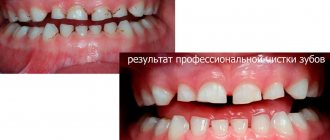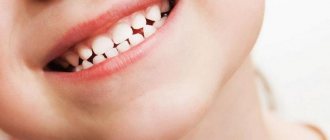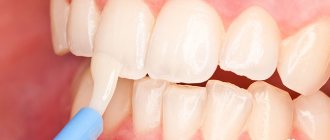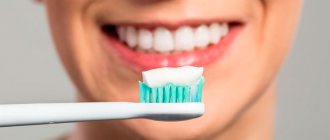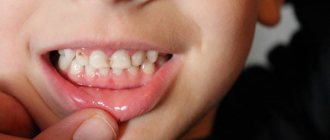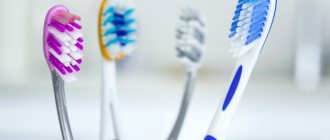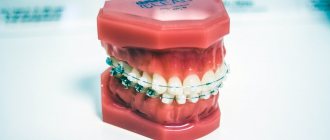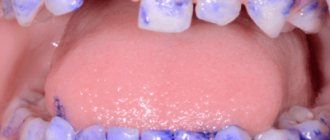Causes of darkening of teeth
Why do my child's teeth turn black? This process can be caused by several reasons:
- early caries;
- poor absorption of calcium by the body;
- plaque;
- insufficient salivation;
- hereditary factors;
- chronic diseases;
- fungus of the gastrointestinal tract;
- dysbacteriosis;
- the predominance of foods containing large amounts of sugar in the diet;
- disturbance of fluoride metabolism;
- metabolic disease;
- parents sharing cutlery with their children, licking the child's pacifier or kissing on the lips;
- taking medications containing iron;
- insufficient formation of enamel.
There are many reasons why teeth can darken, but especially often the darkening begins due to childhood caries caused by one of the following factors:
- mechanical (shocks or injuries);
- chemical;
- thermal (temperature difference: eating hot food and immediately cold food and vice versa);
- bacterial (development of oral bacteria)
Causes of tooth bruise
As with any mechanical impact, a tooth bruise can be caused by a number of reasons.
There are several of the most common cases that can result in such an injury:
- In the process of playing sports, a tooth can be injured in an accident. For example, when playing football, the ball may fly out unsuccessfully and hit the child in the jaw area. Such an injury can be serious, and the bruise will be noticeable on the external surface.
- A car accident also often causes a tooth bruise. In a car accident, you can suffer a large number of injuries of various types. And even if everything turned out well at first glance, the child in any case must be taken to the doctor.
- Domestic trauma is perhaps the most common cause of severe injury. Moreover, it can be caused by a seemingly harmless object. Even careless use of the cup in some cases causes severe bruising of the teeth.
The most vulnerable teeth are the front incisors. In most cases, the impact falls on the upper teeth, this is due to their anatomical structure.
What to do if your teeth turn black
An important role is played by the structure of the child’s tooth enamel, which directly depends on heredity, as well as the composition of the saliva that washes the surface of the tooth. When the required composition of saliva is disrupted (which occurs when there is a deficiency of fats, carbohydrates, fats, vitamins or minerals), plaque appears on the teeth. This is what causes teeth to darken. Do not try to get rid of it by brushing your teeth - this is useless, as the plaque will appear again. The way out of this situation will be to revise the children's diet, which should include foods rich in calcium, iron and other substances useful for strengthening teeth, including carrots, apples, cottage cheese and other dairy products, and, of course, fish. If a child’s teeth turn black, the first thing you should do is consult a dentist to find out the reasons for this process. Don't neglect your baby's teeth, because childhood caries develops quickly and can lead to undesirable consequences in the future if it is not prevented in time.
Preventive measures
You can avoid darkening of teeth in childhood without much hassle. Parents are advised to remember the basic rules, which are very important to adhere to:
- Pay sufficient attention to regular checks of the quality of the child’s oral hygiene. It is better to teach children the need to brush their teeth after the first tooth appears (even before the age of 12 months). Thanks to the formation of this habit from the first years of life, it will be possible to maintain the beautiful color of the teeth and the health of the child in general.
- A thoughtful diet is very important to prevent the darkening of children's teeth. Consuming sufficient amounts of key nutrients, minerals and vitamins significantly reduces the likelihood of developing dental problems. To avoid the appearance of black teeth in baby teeth, parents should control the amount of sweet carbonated drinks, confectionery and white pastries in the child’s diet. At the same time, it is very important that children consume raw vegetables and fruits, as well as dairy products.
- It is important to select the appropriate teeth cleaning products. For example, one-year-old children need a completely different toothpaste compared to schoolchildren. It is important to regularly replace toothbrushes, the choice of which also depends on age.
- In areas where drinking water contains high amounts of fluoride, it is important to control its quality. This is a very important moment for children in the first year of life, because it is at this time that bones and teeth are formed.
- Regular visits to a specialist for preventive examination, therapy and cleaning are factors that prevent the darkening of baby teeth.
- To prevent caries or treat a minor problem of this type, it is better to use deep fluoridation instead of silvering. The procedure prevents the development of dark plaque and is more effective.
All experts say that preventing problems with baby teeth is easier than treating them. Regular preventative measures minimize the likelihood that your child's teeth will begin to turn black or fall out before permanent teeth emerge.
The importance of healthy baby teeth
Many parents are convinced that treatment of baby teeth is not so important, since these are not molars. However, they are wrong: the last milk teeth fall out in children aged 12-13 years, and if up to this point the milk teeth were lost, for example, due to caries, then the long-term absence of teeth, in the place of which permanent ones later grow, leads to the formation of incorrect bite In addition, the fact how healthy the permanent teeth will be directly depends on whether the baby teeth were carefully looked after in childhood. You can prevent the development of caries by not ignoring visits to the dentist at least twice a year and proper oral hygiene.
Causes: why it occurs in children
The causes of blackheads on baby teeth can vary from simple and minor to serious with serious consequences. Among the main reasons are:
- Priestley's plaque (it is not dangerous, goes away with age, and rarely transfers to permanent teeth);
- caries (first stage - yellow teeth, turning black if not treated);
- problems with intestinal microflora;
- little calcium in the body;
- a lot of iron in the body;
- heredity (if the parents had the same teeth);
- slight secretion of saliva (poorly protects tooth enamel).
With frequent colds, the development of various diseases, or taking antibiotics, bacteria begin to actively develop in the child’s mouth. If a one-year-old baby uses a rubber pacifier, then bottle caries begins to develop, which leads to the formation of black plaque on the teeth. A problem can also arise if you choose the wrong toothpaste - it must be appropriate for the child’s age.
How to prevent blackening of teeth
Blackening of teeth can be prevented by teaching your child to regularly take care of the oral cavity and not to eat late in the evening. It is worth cleaning baby teeth with plain water or chamomile decoction, after which you can switch to children’s toothpastes. If your child still experiences darkening of the teeth, you should contact your dentist. As a rule, doctors first clean the top layer of dental tissue and then cover it with special cement. In some cases, the silver plating method is used. If caries is already in the active stage of development, it is best to remove the tooth so that the disease does not spread to neighboring ones. Take care of your child's teeth, and then there will be no problems with them.
Article material approved by doctor: Evgeniy Aleksandrovich Nikitin Dentist-therapist, orthopedist, pediatric dentist
10 years
How is a bruise diagnosed?
How to behave if a child’s tooth has darkened after a blow? Try to remain calm, the child needs to be shown to the dentist urgently. The doctor will order an x-ray examination, on its basis it will be possible to make a diagnosis. A visual inspection of the damaged area is also performed, the severity of the injury is determined and treatment is prescribed.
The attending physician will tell you how long it will last and by what means it will be performed. Be sure to insist on an x-ray examination, because only an x-ray can reveal all possible disorders and consequences that the injury could lead to.
An impact may result in a fracture of the tooth root, or significant trauma to the alveolar process. These injuries are dangerous and without appropriate treatment can cause irreparable harm not only to baby teeth, but also to permanent teeth.
The first days, treatment should take place under the close supervision of a doctor. The doctor continues to examine the affected area and at the first symptoms of tissue death, immediately removes the affected parts. This prevents further spread of necrosis.
Can teeth turn black not due to caries?
In very rare cases, teenagers may experience darker tooth color if their daily diet includes a lot of soy sauce, coffee, tea, potatoes, or drugs containing fructose. However, such “darkness” is not at all similar to carious lesions and is easy to distinguish.
Do rotten teeth need to be treated?
Undoubtedly. Remember: the opinion that there is no need to treat baby teeth “because they will fall out anyway” is fundamentally wrong and even criminal. Firstly, caries in baby teeth spreads very rapidly: a couple of months ago the child simply had rotten teeth, and today he is already screaming and crying from pulpitis.
Secondly, untreated caries of a baby tooth can cause inflammation of the soft tissues, the appearance of an abscess, as well as such serious consequences as:
- Sepsis;
- Meningitis;
- Damage to large blood vessels in the neck area;
- Otitis;
- Sinusitis;
- Stomach pain, intestinal disorders, stool disorders and other gastrointestinal diseases.
Thirdly, advanced caries and tooth decay can lead to premature loss of a baby tooth, and subsequently to disruption of the even dentition of molars. Don’t forget that a rotten baby tooth can “infect” a molar tooth with caries.
Don’t forget about children’s complexes: rotten teeth look unsightly and cause significant discomfort to the baby.
How to spot rotting at an early stage?
In order not to go through all the horrors of treating rotten teeth with your beloved daughter or son, be able to recognize the first signs of caries in time:
- The characteristic “rotten” odor from a child’s mouth indicates the presence of cavities.
- Small yellowish spots on the teeth are the first stage of caries.
- A child’s complaints about discomfort when drinking cold, hot and sweet drinks and foods indicate thinning of the enamel.
- The characteristic black spots on the teeth are caries that need to be treated.
Do not forget that it is better to treat caries at an early stage, because it will be much more difficult to eliminate the problem of rotten teeth later.
How to cure rotten teeth?
To cure rotten teeth in a child means taking the baby to the dentist. If the baby’s teeth have already turned black, it is useless to treat them with folk remedies. A variety of balms, rinses and masks can only slow down caries.
An experienced dentist treats rotten teeth in children in stages:
- The doctor examines the oral cavity, identifies areas of caries and inflammation of the gums, and, if necessary, sends the child for an x-ray.
- Teeth are cleaned and caries is treated. If lesions have been identified in several teeth, the doctor draws up a treatment regimen. Milk teeth that cannot be cured are removed.
- To disinfect affected gums, the doctor may prescribe special rinses with herbal decoctions; in rare cases, antibiotics are prescribed to destroy the infection.
Parents should not forget that it is not enough to just cure rotten teeth. It is important to eliminate the cause of caries, otherwise in a couple of months the baby will end up in the dentist's chair again. For example, if the doctor said that the cause of caries lies in the gastrointestinal tract, it is important to visit a gastroenterologist with your child. If the teeth begin to rot because the baby is leaning on candy and soda, reconsider the diet.
There are alternative ways to treat teeth that are slightly affected by caries:
- Remineralization. The dentist strengthens the surface of the teeth with a special mineral composition.
- Silvering. If the child does not allow a filling to be placed, and the tooth is not severely affected by caries, the doctor can strengthen the damaged surface with a solution of silver nitrate.
- Laser therapy. In rare cases, shallow caries can be treated with a laser.
- Deep fluoridation is effective for minor enamel damage. After this procedure, the teeth are saturated with useful minerals for a long time.
- Ozonation for mild caries can clean the rotten row from pathogenic microorganisms.
How to prevent the appearance of rotten baby teeth?
To prevent the child’s teeth from rotting and the dental drill from marring the joyful moments of childhood, it is important to carry out proper caries prevention.
1. Be attentive to your baby
Examine your child’s teeth every two to three days and if characteristic carious cavities appear, immediately make an appointment for the baby to see a doctor.
2. Visit your dentist regularly
Even if you have not noticed any changes in your child’s oral cavity, be sure to take him to the doctor on a preventive basis. The pediatric dentist should be visited twice a year. An experienced specialist can even notice the beginning of caries, which appears as a light spot on the tooth. If caries is detected in a timely manner at an early stage, the doctor can slow down or stop its development using an enamel remineralization procedure.
It is recommended to visit the dentist in the morning, when the baby is alert and calm, and most importantly, has not yet had time to “work up” himself with fears.
3. Strengthen your enamel
Of course, the baby does not need to take antibiotics and anti-inflammatory drugs without a doctor’s prescription. However, you can completely strengthen your child’s enamel with natural ingredients, for example, rinse the mouth with herbal decoctions - oak bark, sage, calendula. These herbs have excellent anti-inflammatory, calming effects.
4. Watch your diet
Believe me, kids in adolescence and young adulthood will have time to eat plenty of chips and drink soda. But in early childhood, you can completely control the diet of your kids. Make sure that your child does not consume a lot of sweets and sours, give the baby more vegetables and fruits - fresh fruits are magic boxes of vitamins and help to naturally cleanse teeth. And, of course, give your child more milk, cottage cheese, kefir and other goodies from cows and goats.
How to properly brush baby teeth?
Teaching a child to take care of his teeth from childhood means ensuring him a happy adolescence and youth without toothache. And caring for your teeth means, first of all, proper brushing. Until the age of 3, it is better to help the child with this procedure, but after three, you can trust the child to brush his teeth on his own.
Remember:
- Teeth need to be brushed from top to bottom - this is the only way to remove the plaque that has formed.
- You need to brush your teeth for at least 2 minutes. Try placing an hourglass in your baby's bathroom, which will teach him to carry out the procedure for a long time. After finishing cleaning, rinse your mouth.
- Children, like adults, should brush their teeth twice a day - morning and evening, before bed. It is important to rinse your mouth after every meal.
To make the process of brushing teeth enjoyable for your baby, it is important to carefully choose toothpaste. For example, ASEPTA BABY gel toothpaste can be used for babies from 0 to 3 years old. The soft gel gently cares for your child's teeth and gums without damaging them. The natural components of the paste provide protection against caries and inflammatory processes in the oral cavity; the bright taste of “tutti-fruiti” makes cleaning a delicious adventure. But the main thing is that “ASEPTA BABY” does not contain abrasives, fluorine, parabens, or sodium lauryl sulfate.
We hope our recommendations for caring for children's teeth and caries treatment will be useful to you. And rotten teeth will never bother either kids or their parents.
Common reasons
Darkening of teeth can look different:
- If the discoloration is caused by plaque that is not properly removed, the color of the dentition appears uneven, darker at the base and lighter towards the edges; Possible causes are abuse of coffee and tea (strongly brewed drinks have a powerful coloring effect) and smoking. It is very difficult for tea, coffee and nicotine lovers to maintain a snow-white smile; they practically have to choose between beautiful teeth and established habits.
- If one or more teeth have a pronounced color difference, we have to talk about poor-quality canal treatment or the development of secondary caries (after removal of the nerve, the darkening of the tooth is explained by the lack of nutrition and is natural; a dark rim around the filling is a signal for its immediate replacement due to a violation of the tightness ). A tooth can also be darkened by trauma that causes nerve death or internal bleeding; whiteness can only be restored through careful treatment of the canals, sometimes with intracanal bleaching.
Black plaque is not only a death sentence for a smile, but also a possible cause of caries. Only regular visits to the dentist will help you avoid troubles and keep your teeth healthy and white.
Black teeth: what to do
The best way to solve the problem of black teeth is to see a doctor. The dentist will determine the cause of the color change and tell you how it can be eliminated. If your teeth have darkened due to the accumulation and staining of plaque, professional hygiene will help restore them to their original color. For example, contactless cleaning using the Air-flow method. If, in addition to plaque, tartar has formed on the teeth, this procedure can be combined with ultrasonic cleaning.
To eliminate the blackness that appears due to bacterial damage to dentin, you need to cure a carious tooth. This also applies to secondary caries. There are methods for lightening teeth that have changed color due to the components of filling materials. They are effective if the tooth has darkened by no more than 1-2 shades. If it is impossible to restore the natural color of the tooth, the dentist will suggest covering it with a crown or installing a veneer.
Our clinic’s specialists will restore the whiteness of your teeth, no matter why they have darkened. To consult with a doctor, make an appointment for a free initial appointment using the form on the website or by phone.
